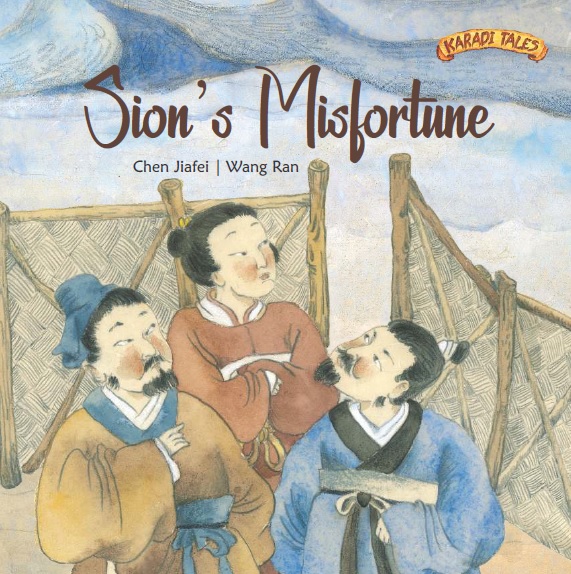Advaita Manikkath is an editorial intern at Karadi Tales. This is her review of Sion’s Misfortune by Chen Jiafei, illustrated by Wang Ran.
Sion’s Misfortune: Book Review

Sion’s Misfortune is a story about a man’s unerring optimism in the face of unexpected hardships. Told through the artist Wang Ran’s uncluttered and classical looking watercolours, each page is interspersed with image and text that carry the reader through an ancient China of feuding kingdoms, small village life, unruly steeds and the intangible magic and wisdom of one fortune-teller’s trust in fate and eventuality. Chen Jiafei’s simple yet evocative prose is placed gently besides Ran’s illustrations that give it the space to breathe and unfold at its own pace.
At its most reduced, Sion’s Misfortune can be described as a glass half full versus empty kind of a story but doing so would not do justice to the many nuances in it.
Little things such as the supremely unconcerned, almost gleeful, way in which Sion responds to the pity of the people; a sentence or two that expresses his immense relief at the blossoming adventurousness in his timid son; the subtle tension as the elders learn that they’ll have to send the young off to war – all add elements of humour, empathy and dread that makes the individual parts almost as good as the whole. The story manages to say quite a lot with so little.
Sion’s Misfortune also does not shy away from clearly stating the wisdom it hopes to convey – something that is given a fair amount of weight over the brief but grounding descriptions of the horror and apathy of war and conscription in Jiafei’s feudal China. Ran’s use of scale to equate the forts and houses to the human beings who live in and fight over it, visually and narratively helps put the human at the forefront of the story.
The portrayal of Chinese culture throughout – the flowing long sleeved robes, the stately war attire, the Great Wall of China in the first page and even Ran’s addition of a dragon whose appearance is as sudden and inexplicable as its disappearance – all good introductions for a child to the idea of China and its folklore.
Through Sion’s Misfortune, Jiafei and Ran achieve many things – they competently adapt a folktale to contemporary times without losing out on its sense of old-timey mysticism, break down some pretty heavy concepts so that it’s easily understood by a child and reiterate the need to believe in one’s own truth and to always look for the best that is yet to come – a message that is eternal and one especially necessary in our current times.